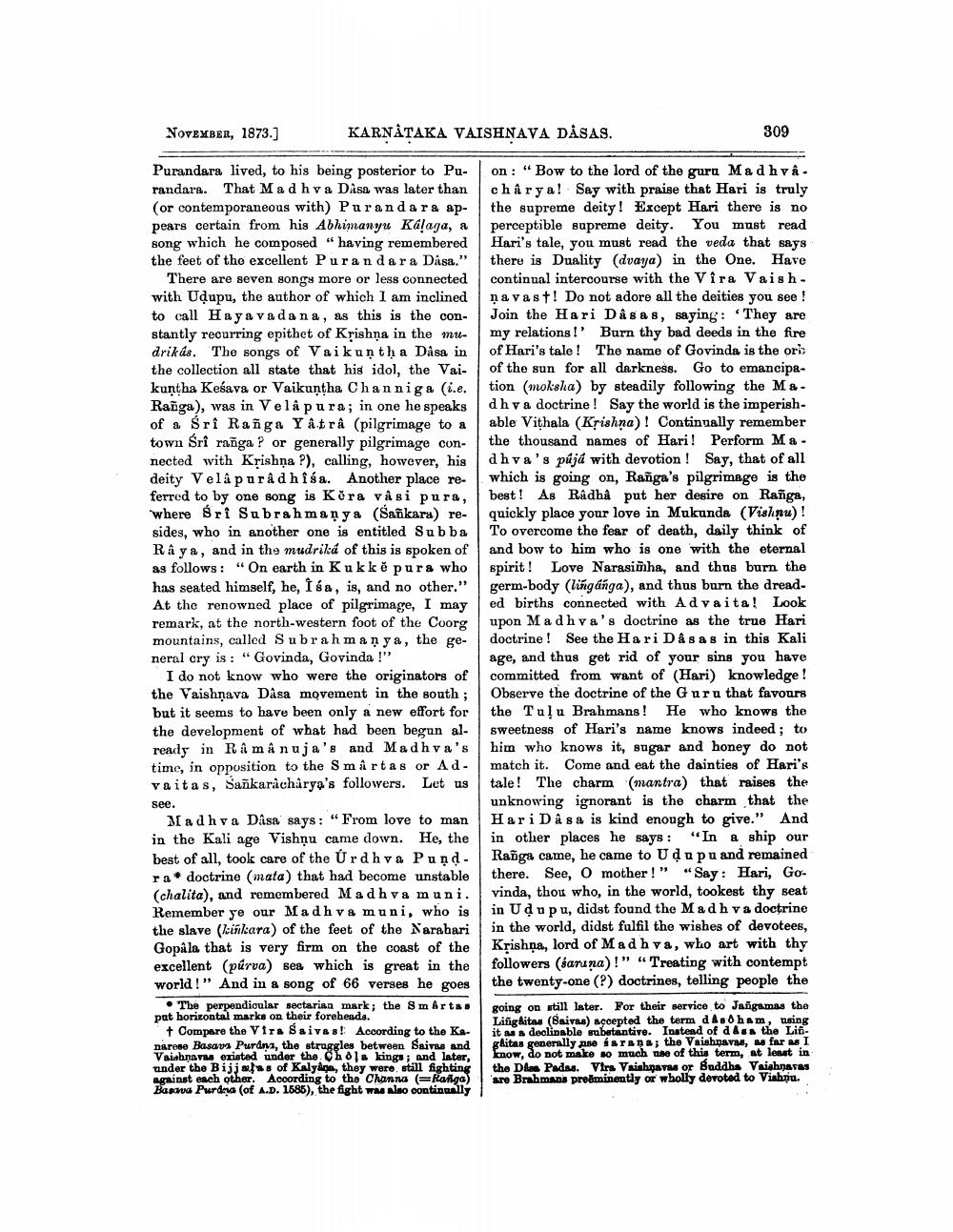________________
KARNATAKA VAISHNAVA DASAS.
NOVEMBER, 1873.]
Purandara lived, to his being posterior to Purandara. That Madhva Dasa was later than (or contemporaneous with) Purandara appears certain from his Abhimanyu Kálaga, a song which he composed "having remembered the feet of the excellent Purandara Dasa."
There are seven songs more or less connected with Uḍupu, the author of which I am inclined to call Hayavadana, as this is the constantly recurring epithet of Krishna in the mudrikas. The songs of Vaikuntha Dasa in the collection all state that his idol, the Vaikuntha Kesava or Vaikuntha Channiga (i.e. Ranga), was in Velâ pura; in one he speaks of a Sri Ranga Yatra (pilgrimage to a town Śri rañga? or generally pilgrimage connected with Krishna ?), calling, however, his deity Velâpurâdhisa. Another place referred to by one song is Kera vasi pura, where Sri Subrahmanya (Sankara) resides, who in another one is entitled Subba Raya, and in the mudriká of this is spoken of as follows: "On earth in Kukkě pura who has seated himself, he, Isa, is, and no other." At the renowned place of pilgrimage, I may remark, at the north-western foot of the Coorg mountains, called Subrahmanya, the general cry is: "Govinda, Govinda !"
I do not know who were the originators of the Vaishnava Dâsa movement in the south; but it seems to have been only a new effort for the development of what had been begun already in Râ mânuja's and Madhva's time, in opposition to the S mârtas or Advaitas, Sankaracharya's followers. Let us
see.
Madhva Dâsa says: "From love to man in the Kali age Vishnu came down. He, the best of all, took care of the Urdhva Pund. ra doctrine (mata) that had become unstable (chalita), and remembered Madhva muni. Remember ye our Madhva muni, who is the slave (kinkara) of the feet of the Narahari Gopala that is very firm on the coast of the excellent (púrva) sea which is great in the world!" And in a song of 66 verses he goes
The perpendicular sectarian mark; the Smartas put horizontal marks on their foreheads."
+ Compare the Vira Saivas! According to the Kanarese Basava Purana, the struggles between Saivas and Vaishnavas existed under the Chola kings; and later, under the Bijjalas of Kalyana, they were still fighting against each other. According to the Channa (Ranga) Basava Purana (of A.D. 1585), the fight was also continually
309
on: "Bow to the lord of the guru Madhvâ. charya! Say with praise that Hari is truly the supreme deity! Except Hari there is no perceptible supreme deity. You must read Hari's tale, you must read the veda that says there is Duality (dvaya) in the One. Have continual intercourse with the Vîra Vaishnavast! Do not adore all the deities you see ! Join the Hari Dâsas, saying: "They are my relations!' Burn thy bad deeds in the fire of Hari's tale! The name of Govinda is the ori of the sun for all darkness. Go to emancipation (moksha) by steadily following the Madhva doctrine! Say the world is the imperishable Vithala (Krishna)! Continually remember the thousand names of Hari! Perform Madhva's pújá with devotion! Say, that of all which is going on, Ranga's pilgrimage is the best! As Râdhâ put her desire on Rañga, quickly place your love in Mukunda (Vishnu)! To overcome the fear of death, daily think of and bow to him who is one with the eternal spirit! Love Narasimha, and thus burn the germ-body (lingánga), and thus burn the dread
ed births connected with Advaita! Look upon Madhva's doctrine as the true Hari doctrine! See the Hari Dâs as in this Kali age, and thus get rid of your sins you have committed from want of (Hari) knowledge! Observe the doctrine of the Guru that favours the Tulu Brahmans! He who knows the sweetness of Hari's name knows indeed; to him who knows it, sugar and honey do not match it. Come and eat the dainties of Hari's tale! The charm (mantra) that raises the unknowing ignorant is the charm that the Hari Dâsa is kind enough to give." And in other places he says: "In a ship our Ranga came, he came to Udupu and remained there. See, O mother!" "Say: Hari, Govinda, thou who, in the world, tookest thy seat in Udupu, didst found the Madh va doctrine in the world, didst fulfil the wishes of devotees, Krishna, lord of M ad hva, who art with thy followers (saruna)!" "Treating with contempt the twenty-one (?) doctrines, telling people the
going on still later. For their service to Jañgamas the Ling&itas (Saivas) accepted the term disô ham, using it as a declinable substantive. Instead of disa the Lingaitas generally use sarana; the Vaishnavas, as far as I know, do not make so much use of this term, at least inthe Dias Padas. Virs Vaishnavas or Buddha Vaishnavas are Brahmans preeminently or wholly devoted to Vishnu.




